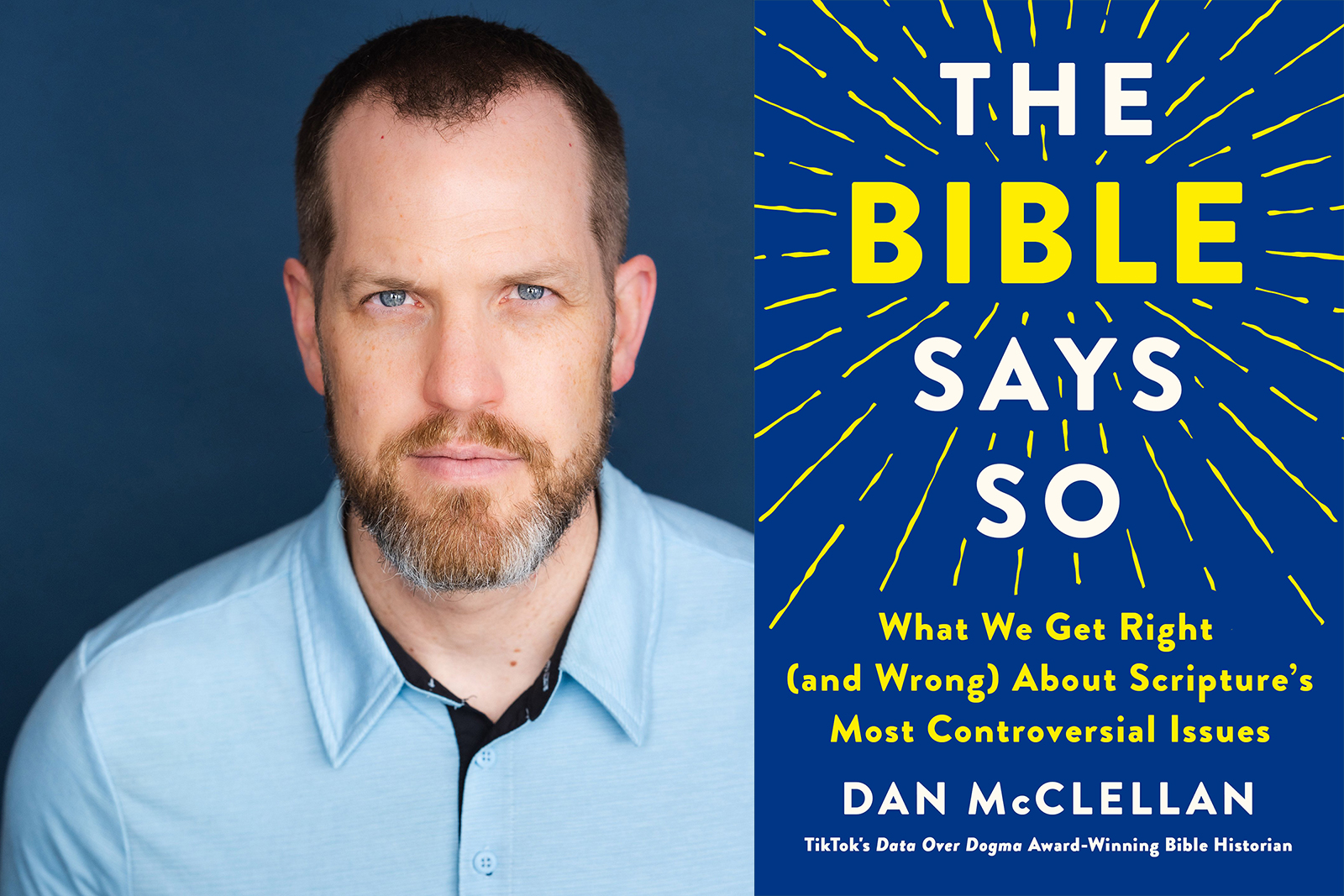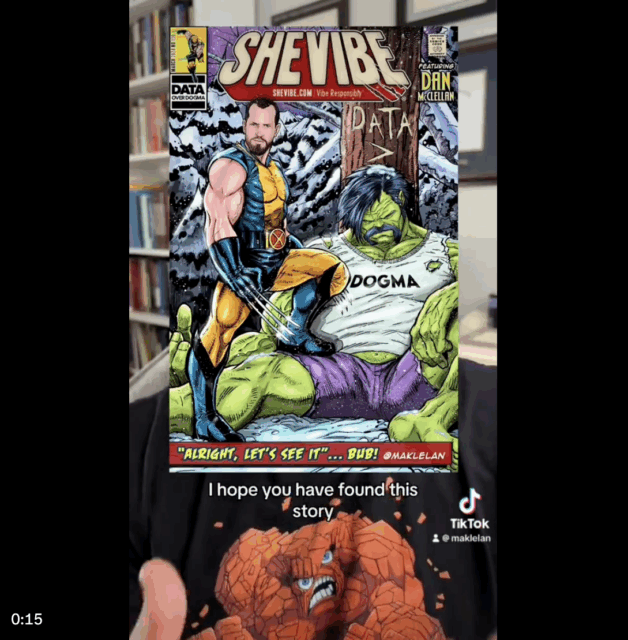
(RNS) — “Data over dogma.”
That’s the tagline of Dan McClellan, the TikTok and YouTube star who had about a quarter-of-a-million followers when RNS first profiled him in 2022. Today, his combined social media presence has nearly 1.4 million followers spread across platforms.
But some things haven’t changed. The biblical scholar with two master’s degrees and a Ph.D. still sports his superhero T-shirts on camera as he seeks to debunk the various kinds of bunk people claim about the Bible. His humor and approachability are a big part of the appeal. And, he’s part of a far too small subset of humans who can both read Ugaritic and nerd-out on comic books.
In his first book, “The Bible Says So: What We Get Right (and Wrong) About Scripture’s Most Controversial Issues,” to be released by St. Martin’s on Tuesday (April 29), McClellan sets the record straight about a number of hot-button topics he’s featured on his TikTok and YouTube channels, including:
- No, the Bible doesn’t say that life begins at conception: According to McClellan, conservatives are wrong to say the Bible identifies an unborn fetus as a person or that it condemns abortion as a sin. But the Bible also doesn’t provide instructions for brewing up an abortifacient, as some liberals have argued. In fact, the Bible doesn’t directly address abortion at all.
- No, the Bible didn’t prophesy that the Messiah would be born of a virgin: That’s a long-standing mistranslation.
- But yes, the Bible does tell you to spank your children early and often: That doesn’t give you permission to go and whack your kids, and McClellan points out the Bible also condones owning other human beings, so it’s not always a foolproof arbiter of relational morality.
“I’m trying to call balls and strikes rather than bat for either team,” McClellan said in a Zoom interview on April 14. “I get hate from across the entire spectrum of belief and nonbelief, which means I am right in the sweet spot.”
As an opener, the book points out that what we know as “the Bible” as a single unit is largely an invention. Rather, it’s a hodgepodge of ancient books — including more than the 66 that are in the Protestant canon — written individually over hundreds of years and only gathered together much later. Knowing this history “kind of disarms a lot of the ways the Bible can be weaponized,” he said.
“There are so many people out there who think that if ‘the Bible says so,’ that’s the end of the story,” he said. “I wanted to show that there is so much more to the story than ‘the Bible says so.’ Frequently, the Bible does not say that. Or even if it does say that, it might say the exact opposite as well somewhere else.”
McClellan is an active member of The Church of Jesus Christ of Latter-day Saints and spent 10 years working as a linguist for the church’s Scripture translation department. He’s a former LDS missionary and now a father of three, living in Herriman southwest of Salt Lake City. He is open about his religious affiliation but said he keeps his personal beliefs “firmly compartmentalized when I am engaging in scholarship.”
However, he said he still gets knee-jerk responses from viewers of his content who think his LDS identity tells them everything they need to know about how he’s going to approach the Bible. Some have accused him of being a Mormon apologist, a charge he said is “laughably uninformed” since his scholarly views of the Bible often disagree with the church’s official positions on Scripture.
Online, McClellan’s approach is to directly engage with the videos and tweets of people who are twisting the Bible in some way, often to support a political or social agenda. His book adopts this strategy as well. Most of its topical chapters open with a story about someone who has used social media to spread misinformation about Scripture.
Whether he’s contradicting a Christian apologist who tries to downplay the Bible’s support for slavery or confronting evangelical men who denigrate women as “Jezebels” when they don’t cover up their bodies, McClellan isn’t afraid of direct clashes with people he disagrees with.

Dan McClellan holds comic book art a fan made of him on TikTok. (Screenshot)
Still, the book mostly avoids polemics. “I reserve that for those instances where folks are using what I consider to be harmful rhetoric, aiming at historically or traditionally minoritized, marginalized or oppressed groups,” he said. Those groups include LGBTQIA+ people, women and others that “particularly Christian nationalists have been coming after in recent years.”
Part of the reason he names names when he recounts these online exchanges is there’s a lot at stake in how people use and misuse the Bible.
“I think the one that is the most harmful these days is related to LGBTQIA identities. Particularly trans folks today, their identities are being erased,” he said. “We have governments saying, ‘No, that doesn’t exist.’ And they are appealing to the Bible, and the idea of a transgender identity is not really in the Bible.” Neither is homosexuality as an identity, though many conservatives have used a few verses from Leviticus and Paul to claim the Bible condemns it.
McClellan notes in his book that the people who insist Paul condemns same-sex sexual intercourse focus only on that one part of Paul’s overall sexual ethic while ignoring the other parts Paul emphasized more. “They’re almost never talking about celibacy, avoiding having kids or passionless sex meant to keep the urges at bay,” he writes.
Real lives are at stake in such debates, he said. So while McClellan takes an academic approach to the Bible, the questions he brings to it aren’t merely academic or hypothetical.
“We still hear about from time to time about children taking their own lives because of this kind of thing, and that’s just intolerable. To me, that’s just unacceptable,” he said. Where he lives in Utah, the state Legislature has enacted laws that go “directly against the mental health of an awful lot of children here,” he added.
McClellan ran for Utah’s Legislature himself twice, “mainly to annoy incumbents,” as he put it. Both times, he garnered over a third of the vote, a strong showing for a Democrat in a ruby-red state.
He said he will continue sticking up for people who are discriminated against, especially when those doing the discriminating are wielding the Bible as a bludgeon in support of their views.
“I think we need to do better,” he said. “Let’s at least be responsible as we negotiate with the Bible, and let’s try to do so in a way that is going to increase freedom of expression and freedom of religion and all these things, rather than try to mitigate it just so that we can have greater access to power.”
